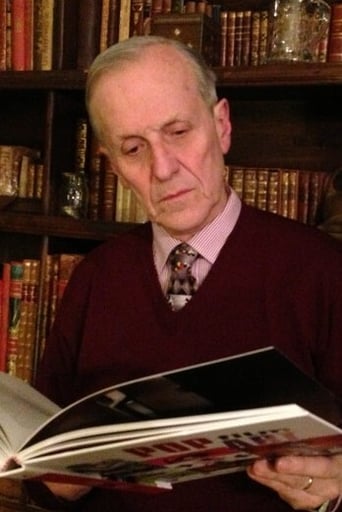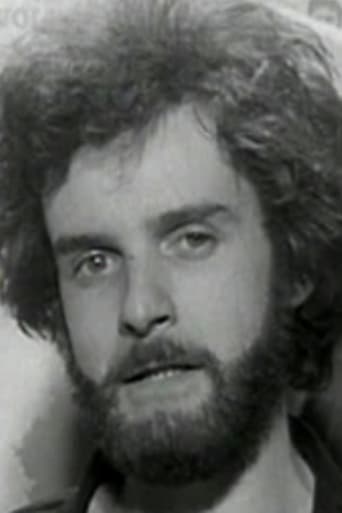Mjeteconer
Just perfect...
FeistyUpper
If you don't like this, we can't be friends.
Kidskycom
It's funny watching the elements come together in this complicated scam. On one hand, the set-up isn't quite as complex as it seems, but there's an easy sense of fun in every exchange.
BallWubba
Wow! What a bizarre film! Unfortunately the few funny moments there were were quite overshadowed by it's completely weird and random vibe throughout.
Gymnopedies
They Have Changed Their Face is perhaps the most innovating and original take on the Bram Stoker's novel Dracula. In this intoxicating allegory on capitalism, they substituted the well- trodden Dracula with a successful and powerful businessman, Giovanni Nosferatu, the head of a massive corporation, who invites a low- ranking employee to, from what appears on the exterior as an old dilapidated villa. As soon as he arrives in the locality - things are not quite what they seem. He soon finds the locale nearly deserted with the heavy fog enveloping everything in sight. He tries to ask the few locals for directions but they are behaving most peculiarly, non-compliant and almost in a trance. That should have been a deterrent! Before entering the villa, he meets a young attractive woman. She promptly changes her outward behavior from a free-spirit to a tense and overly manner. The employee eventually comes to the conclusion to himself that, Giovanni Nosferatu, is a vampire.There are many strange and intriguing details in the film such as the villa, from the exterior, appears as an old dilapidated villa that is crumbling with ancient grounds to a highly modernistic interior, well-stocked with apparatuses that vents out adverts for the products that his corporation sells. From the intimidating band of cars that patrol the grounds of the villa that kills anyone who is trespassing to marketing of illicit products like "domestic LSD" or the nursery offering predetermined career paths for babies. It is a very well- made and stylish horror that throws around references to Godard, Fellini and Bergman. I'm sold!It is an obvious allegory to capitalism, with the most affluent portrayed as "vampires" who appear to feed off consumerism, hence why They Have Changed Their Face. It is a biting and satirical moody piece, but above all, it is really good and at just 285 votes-it is shockingly unknown to the masses. If this was made in 2017 we would all be saying it was way ahead of its time, but it was in fact made in 1971! They Have Changed Their Face is a thoroughly original and intelligent slice of Italian horror.
Red-Barracuda
This Italian horror film is one that is most certainly coming at us from a decidedly different angle. Its director Corrado Farina was also responsible for the more well-known Baba Yaga but for my money They Have Changed Their Face is the better film. It's an adaption of Bram Stoker's novel Dracula but with some serious differences. In it the Dracula substitute is a powerful businessman called Giovanni Nosferatu. Like the book, he also lives in a remote mountainous region of Eastern Europe and the storyline also follows a hapless businessman who has been sent to see him. But aside from a similar basic story structure this film takes the material into very unusual places. Atypically for an Italian horror film this is a somewhat satirical movie. It's an allegory on capitalism, where the modern vampires have moved with the times and now prey on the public differently. Instead of sucking their blood, they suck the life from them with soul-destroying commercials and generally prey on the population with ruthless capitalism.All this is well and good but what takes it up a level is the overall strangeness of the presentation. The vampire's house is a crumbling old building but inside it is very chic and modern. His henchmen drive around in white minis while sporting jump suits and helmets. While inside the house the hero is exposed to commercials; cumulating in an excellent later scene where a selection of newly developed adverts are shown to Mr Nosferatu in his board room. It's all very disconcerting and, to be honest, it's very hard predicting where this one is going to go. This is very inventive genre film-making that's for sure. The soundtrack by Amedeo Tommasi is great as well, with a variety of tones and themes. It helps set the atmosphere, which is one of real mystery. There is also a good cast too. Adolfo Celi is well suited to the role of Giovanni Nosferatu. But perhaps most interesting of all is Geraldine Hooper who was most famous for her turn as a male homosexual in Dario Argento's Deep Red. Frankly, it was only due to this film that I was even aware that she was not a bloke!This is one of the most original Italian genre pictures from the 70's. It's one that certainly needs to be seen by a far wider audience.
MARIO GAUCI
A largely unknown but highly rewarding Euro-Cult gem that transposes the ancient Transylvanian vampire legend into the commercialized industrial age of 1970s Italy; director Farina is perhaps best-known (if at all) for the Carroll Baker-starring adult comic-strip adaptation BABY YAGA (1973) – a film which I was kind of lukewarm on at first glance but would now love to revisit (for the record, I do own the Blue Underground DVD of it). The mostly anonymous cast is headed by distinguished character actor Adolfo Celi (playing the all-powerful tycoon Giovanni Nosferatu) and whose underlings include one Harker, one Van Helsing, etc.!; the hero of the piece is played by Giuliano Disperati (who reminded me of a less handsome version of Hurd Hatfield) and their female counterparts are essayed by Geraldine Hooper (as Celi's androgynous secretary) and red-headed hottie Francesca Modigliani (portraying a bare-breasted hippy who hitches a ride in Disperati's car and stays on). Obviously, Jean-Luc Godard had already paid similar tribute to F.W. Murnau's Silent vampire masterpiece in his own iconic neo-noir/sci-fi opus ALPHAVILLE (1965) by naming the Howard Vernon character as Professor Nosferatu von Braun; the beauty of Farina's – and co-writer/assistant director/editor Giulio Berruti (who would go on to direct the middling nunsploitation/slasher KILLER NUN [1978]) – concept, however, is that (as the film's very title implies) vampires have nowadays changed their faces and instead of sporting bloodied fangs and enveloping cloaks, they don suits, haunt business boardrooms and prey upon millions of gullible TV viewers via puerile (but obviously effective) commercials! The film's initial stages have a deceptively light-hearted air about them: predating the amiable "Fantozzi" comedy series of movies by four years, Disperati cannot believe his luck in being invited to meet the elusive President of the firm he works for (who inhabits the 20th floor on which, apparently, only a handful of people have ever been to); when Disperati is invited to Nosferatu's country house, he is made to listen to commercials whenever he gets to sit on the sofa or take a shower! Even so, the subtle choral music on the soundtrack ominously underscores the sinister air of the rural surroundings – represented by Nosferatu's omnipresent watchdog army of white Fiat 500 which 'accompany' every visitor to the villa. Needless to say, the usual expected elements of vampire movies are also present in the mix here: the crypt housing Nosferatu's decaying coffin; the midnight secret meeting of the Vampire and his acolytes (here made up of, among others, a Renfield-like advertising agent dreading his boss' reaction to his clips and even an ecclesiastical authority who imparts his blessing on the latter's work vis-a-vis censorship issues, etc.). Despite Disperati's apparent shooting of Nosferatu (whose main relaxation activity is taking target practice on moaning puppets!), the eventual climactic defection to the cause – conformism to the consumerist mentality – of both hero and (the sadly largely absent) heroine does not really come as a surprise and concludes the movie on a satisfying ROSEMARY'S BABY-like coda.
JOE-58
Vampires are the real BAD guys (i.e. corporate honchos feeding on much more than blood) in this satirical, quirky outing. Visually stunning, with a main character who goes by the name of Giovanni Nosferatu... not to forget an army of white, man-eating utility cars from hell (just forget wimpy, musty ole bats!)... I mean, how can you go wrong?




